This article was co-authored by wikiHow Staff. Our trained team of editors and researchers validate articles for accuracy and comprehensiveness. wikiHow's Content Management Team carefully monitors the work from our editorial staff to ensure that each article is backed by trusted research and meets our high quality standards.
There are 9 references cited in this article, which can be found at the bottom of the page.
This article has been viewed 56,576 times.
Learn more...
The Occupational Safety and Health Administration (OSHA) employs inspectors to evaluate and improve workplace conditions based on federal regulations. Working as an OSHA inspector can be a fulfilling career if you're passionate about workplace safety. Depending on your interests as a health inspector, you can choose between 1 of 3 OSHA career tracks and earn certifications as needed. Choose the track that best fits your interests and make a list of job qualifications so you have an end goal in mind while gaining education and work experience.
Steps
Completing the Necessary Education
-
1Decide between 1 of 3 different career tracks for OSHA inspectors. OSHA inspectors specialize in one of thee tracks: safety and occupational health, safety engineering, and industrial hygiene. The track you choose will help you decide what classes to take in college and OSHA certifications to receive later on.[1]
- Safety and occupational health inspectors focus on employee comfort, like lighting and ventilation.
- Safety engineering inspectors review designs and procedures that help workplaces meet health and safety laws.
- Industrial hygiene inspectors offer advice on environmental issues like noise, dangerous chemicals, and biohazards.
-
2Earn a bachelor's degree in a major related to health and safety standards. Life sciences like biology or occupational health and physical or mathematical sciences like chemistry or engineering prepare individuals for an OSHA career. You may want to major in a life science and minor in a physical or mathematical science to stand out from another candidate.[2]
- If you want to become a safety engineering inspector, for example, your best bet is a civil or mechanical engineering degree.
- Safety engineering inspectors must have an engineering degree to receive certification.
Advertisement -
3Take college courses related to your intended career track. Although OSHA jobs often involve on-the-job training, a working knowledge of federal health regulations can make you a more qualified applicant. If your college offers courses in risk communications, handling hazardous materials, or other health and safety courses, take a few classes relevant to your intended career track.[3]
- If you want to become an industrial hygiene inspector, for example, you may want to take a class in handling hazardous materials.
-
4Earn a master's or doctorate degree to qualify for higher-paying jobs. If you want to qualify for advancement in the OSHA department, you may need a master's degree or PhD related to your focus. Depending on your intended career track, you may consider a degree in engineering, safety and occupational health, environmental health, industrial hygiene, health physics, biosecurity and disaster preparedness, or safety management.[4]
Gaining Work Experience
-
1Work as an occupational health technician while working on your degree. Occupational health technicians work with inspectors on collecting data on evaluating and improving workplace environments. The minimum requirement for most technician jobs is a high school diploma. To gain relevant experience while finishing your bachelor's degree, apply for a technician job.[5]
- Look for open occupational health technician careers at your local OSHA or nearby hospitals, construction companies, or safety consulting firms.
- High school students interested in an occupational health technician job should take courses in English, mathematics, chemistry, biology, and physics.[6]
-
2Apply for a non-OSHA health and safety inspector job. In addition to the OSHA, private companies also hire health inspectors. Non-OSHA health inspector jobs require similar qualifications, like a science-related degree and a working knowledge of federal safety regulations. While searching for OSHA jobs in your area, find work with a hospital, school, construction company, or safety consulting firm.[7]
-
3Look for jobs that improve your communication skills. OSHA inspectors need strong communication skills so they can negotiate with workplace employers and prepare inspection reports. Find a job that requires both written and oral communication to strengthen your qualifications as an OSHA inspector.[8]
- You might, for example, apply for a job that involves writing workplace evaluation reports or working long-term with a business to improve their safety standards.
- If you struggle with written communication skills, take a technical writing course.
-
4Earn an OSHA certification related to your intended career track. Although certification is optional for most OSHA careers, becoming certified can help your application stand out. To complete certifications, contact your local OSHA and ask about upcoming courses. To receive an OSHA certification, you must take a series of classes and pass an administered test at the end of your certification course.[9]
- OSHA certification tracks include health standards for the general industry, occupation zones for the construction zones, and biohazards safety.
- Some OSHA certifications, like for industrial hygiene, require a bachelor's degree and some relevant work experience.[10]
Finding a Position with OSHA
-
1Look online for open OSHA jobs in your area. Visit the Department of Labor careers site frequently to check for OSHA inspector openings. Before applying for the job, you will need to create a Department of Labor profile with your personal information.[11]
- Because the OSHA is part of the Department of Labor, all job openings will be listed online at https://www.dol.gov/general/jobs.
- You may also check the USAJOBS website, which lists all government job vacancies: https://www.usajobs.gov/.
-
2Apply for open OSHA inspector vacancies with your cover letter and resume. Include any OSHA certifications (or other work certifications) you have earned and answer all eligibility questions as required. Read through your application at least twice before submitting to catch missing information and errors.[12]
- If you need assistance with your application, visit the USAJOBS help page: https://www.usajobs.gov/Help/.
- Read the job requirements carefully so you can tailor your cover letter and resume to the job requirements.
-
3Pick 3-4 work experiences to talk about during your job interview. If your local OSHA thinks you'd be a good fit for the job, they may schedule an interview with you. Before you go, keep 3-4 experiences in mind that define yourself as an occupational health inspector and show that you're qualified for the job.
- You might talk about companies you've worked for, projects you've managed, or workplace conditions you've improved as an occupational health inspector.
- Practice common interview questions beforehand so that, if a similar question comes up, you can answer it with confidence.
-
4Complete on-the-job training if you receive the position. Don't panic if you haven't had as much relevant experience in a specific area of health inspection. Most OSHA inspectors receive on-the-job training in state and federal regulations, inspection procedures, and hazard recognition. During your first few weeks as an OSHA inspector, a supervisor or colleague will instruct you on procedures and safety regulations related to your job.[13]
- The length of training generally depends on an applicant's education and previous work experience but usually ranges from several weeks to a month.
-
5Expect to travel and work on your feet as an OSHA inspector. Working with the OSHA is not like an average 9-5 office job. As an occupational safety inspector, you will evaluate offices, factories, hospitals, schools, and other workplaces on their compliance with state and federal regulations. Most of your work will not be at a desk but in the field.
- OSHA inspectors often work more than 40 hours a week and may be called during irregular hours to help with emergencies.
-
6Take periodic OSHA courses, if desired. As you progress in your OSHA inspector job, you may enjoy continuing education classes. Continue taking OSHA classes to strengthen your work skills and qualify for advancement in your career.
- Unless required by your work supervisor, taking supplemental OSHA courses is usually optional.
- If you don't have time or interest in an additional certification, you can take a singular OSHA course.
References
- ↑ https://careertrend.com/how-5409670-become-osha-inspector.html
- ↑ https://www.oshatrain.org/pdf/career_paths_safety.pdf
- ↑ https://learn.org/articles/How_Can_I_Become_a_Health_and_Safety_Inspector.html
- ↑ https://www.osha.gov/dte/edcenters/certificate.html#master
- ↑ https://www.bls.gov/ooh/healthcare/occupational-health-and-safety-specialists-and-technicians.htm#tab-2
- ↑ https://www.bls.gov/ooh/healthcare/occupational-health-and-safety-specialists-and-technicians.htm#tab-4
- ↑ https://learn.org/articles/How_Can_I_Become_a_Health_and_Safety_Inspector.html
- ↑ https://bizfluent.com/info-8524347-osha-inspector-qualifications.html
- ↑ https://www.osha.gov/dte/edcenters/course_description.html







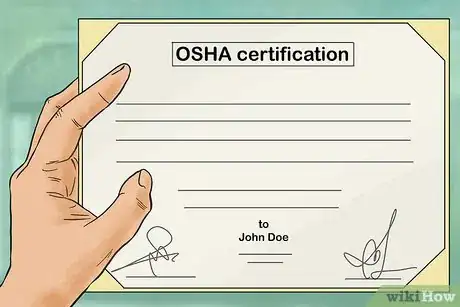
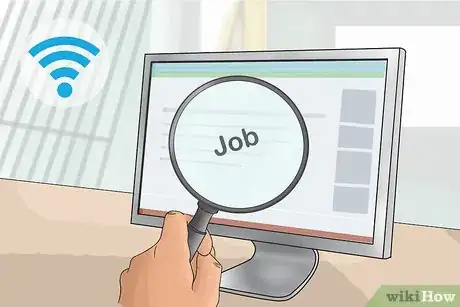












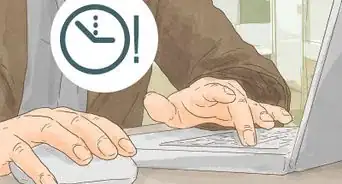
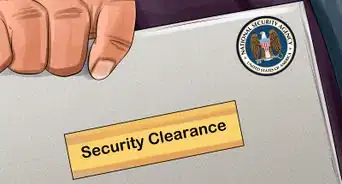












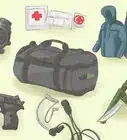






































Medical Disclaimer
The content of this article is not intended to be a substitute for professional medical advice, examination, diagnosis, or treatment. You should always contact your doctor or other qualified healthcare professional before starting, changing, or stopping any kind of health treatment.
Read More...